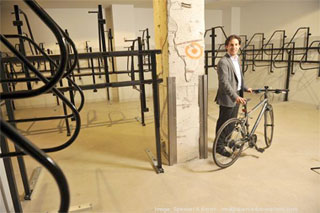News & Awards.
including honors for “Best Mixed Use,”
“Best Office,” and “Best Historic Rehabilitation”.

Landlords snap up sites near BART, Muni stops
TMG Partners' Adam Chall has been in real estate for 15 years, but 2012 was the first time he had a lease negotiation contingent on providing more bike parking in a building.
Biking and hopping on public transportation such as BART or Muni are becoming more common in San Francisco – 40 years after the city implemented its "Transit First" policy – especially among the city's mobile and environmentally conscious tech workers. Evidence of that is how proximity to public transit stations and offering bike-friendly buildings is becoming a big deal for both residential and commercial developers, and making land near transit and along bike routes more valuable than ever.
Kit Hodge, director of the San Francisco Bicycle Coalition, said there has been a "constant and dramatic increase in interest in finding ways to add more bike parking in both residential and commercial properties."
"The conversation among building owners is now increasingly, 'What can I do to keep up with the demand for bike parking from my tenants?'" Hodge said.
One in 10 employees who works in the Hamm's Building on 1550 Bryant St. – which TMG bought in May 2012 – bikes there, Chall said.
"That was a shocking statistic to me," he said. "But we are in the Mission, which is the hottest neighborhood in the city now. Everyone wants to live there, and people want to work near where they live and play. Plus, we are walkable to BART, which is very convenient for tenants."
While the 184,000-square-foot building was already known as bike-friendly, Chall admitted to being surprised when tenant Rdio – an ad-free music subscription service – made extra bike spaces part of their its negotiations.
"They just had so many people who bike to work and our bike parking was filling up so people had to bring their bikes to their suites, which was not good for them and not great for the building," he said. "I can't remember this ever becoming such an integral part of a lease discussion."
So TMG committed to doubling the capacity to about 75 biking spaces and building new showers.
"We have embraced the culture," he said. "It's what our tenants want."
Wilson Meany Sullivan's Joshua Callahan agreed that employers are increasingly concerned about how their employees "can get to work in a way that's efficient or convenient for them."
"Whether that's being close to mass transit stops or the ability to walk to work or bike, employers want to make it easy to get in or out of the office," said Callahan, who is project manager for the redevelopment of 140 New Montgomery St.
The historic 300,000-square-foot building, also known as the PacBell Building, in the South of Market neighborhood, is undergoing major renovation. As part of that, Callahan said, the landlord plans to offer semiprivate bike rooms that companies will share with only one or two other tenants.
"Each tenant has a secured area with card key access, and lockers and showers," he noted. The building, which is 70 percent leased with Yelp Inc. as the anchor tenant, is about a block and a half from the Montgomery Street BART stop.
The demand for bike parking in office buildings reflects the increase in biking, which grew 71 percent in San Francisco between 2006 and 2011, according to the San Francisco Bicycle Coalition.
In response to rising demand, Hodge of the Coalition noted that the planning commission recently approved changes to the city's planning code to increase requirements for bike parking at new and significantly altered developments. The legislation still needs to go through the board of supervisors, but to Hodge, "it is absolutely the sign of the times."
"In some neighborhoods, biking already accounts for about 15 percent of all trips, just to work," Hodge said. "People are taking to bikes like fish to water, and every time the city adds more safe and welcoming bikeways, those numbers jump up."
Muni ridership is also up to 704,000 average boardings per day in 2012 up from 694,000 in 2011.
James Kilpatrick, president of NAI Northern California, a commercial real estate services firm, echoed the belief that proximity to transit is "an enormous factor" to owners and tenants.
"One of the first criteria of companies coming to us to find space is that it's within five blocks or so of BART," he said. "On the tech side, more requirements are definitely asking for bike rooms."
NAI itself went by choice from owning a building in Oakland to renting space 50 steps from BART.
Lenders are taking notice of the "close to transit" trend as well.
"We're seeing with commercial loans, when lenders are doing their underwriting, if a building is right near transportation, it's much more likely that more aggressive underwriting will fly," Kilpatrick said. "People are making assumptions about continued rent growth."


